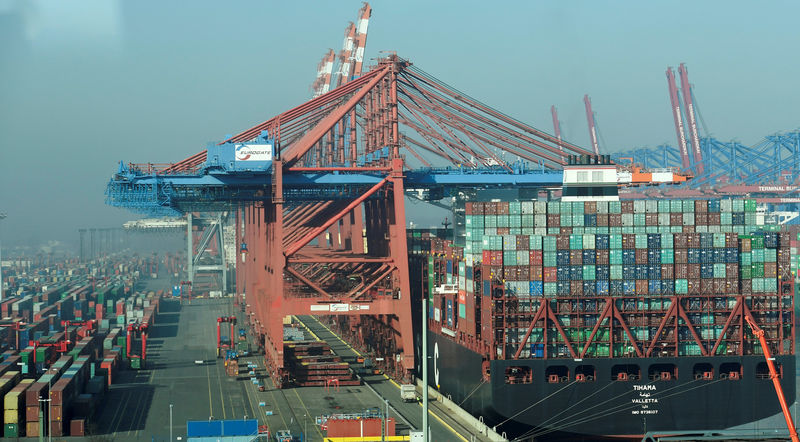By Paul Carrel
BERLIN (Reuters) - German imports grew far faster than exports in July, narrowing the trade surplus and suggesting Europe's largest economy will again rely on domestic demand to drive growth in the third quarter as a stronger euro acts as a headwind for exporters.
Seasonally adjusted exports rose by 0.2 percent on the month while imports were up 2.2 percent, data from the Federal Statistics Office released on Friday showed. Both figures came in weaker than expected.
The seasonally adjusted trade surplus narrowed to 19.5 billion euros ($23.55 billion) from 21.2 billion euros in June. The July reading was lower than the Reuters consensus forecast of 20.3 billion euros.
The trade figures came after data released on Wednesday showed industrial orders fell in July on feeble domestic demand while appetite from abroad was flat - a rare sign of weakness in the economy less than three weeks before federal elections.
But Carsten Brzeski, economist at ING, said the German economy's was still in good shape.
"Even though this week's industrial data was anything but splendid, strong fundamentals combined with buoyant confidence indicators still point to a quick rebound of industrial activity after the summer break," he said.
"The upside of the weak start to the third quarter is that the upside potential has clearly increased."
German business morale fell in August, though by less than expected, after climbing to three record highs in a row, suggesting that a consumption-led upswing in Germany will continue despite concern about a car emissions scandal.
In the second quarter, consumers were the main source of growth in Germany as they reaped the benefits of record-high employment, rising wages and low interest rates.
The European Central Bank's expansive monetary policy has helped support the German economy, which no longer relies on its traditional export engine to drive growth and is instead propelled by domestic demand.
A stronger euro, which is up 14 percent this year against the dollar, will add another headwind to German exporters, though Brzeski noted: "German exports are often less price sensitive than exports from other countries".
ECB President Mario Draghi said on Thursday the euro's strength is already weighing on inflation and will be a key factor for the ECB next month when it decides how to proceed with its massive stimulus programme in 2018.
His cautious comments raised the chances that the ECB will opt to phase out its 2.3 trillion euro bond buying scheme only very slowly next year, despite solid economic growth in the euro zone and worries about real estate bubbles in richer countries such as Germany.
Friday's data showed Germany's current account surplus, which measures the flow of goods, services and investments, fell to 19.4 billion euros after an upwardly revised reading of 25.0 billion euros in June.
The figures came after the Ifo institute said on Thursday that Germany's current account surplus is likely to remain the world's largest this year despite shrinking somewhat mainly due to higher costs for oil and natural gas imports.
